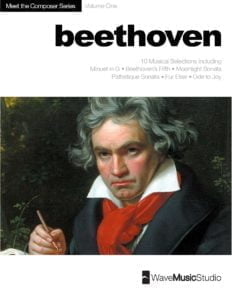Beethoven “Ode to Joy” (“An die Freude” ) 9th Symphony “Choral” 4th Movement piano solo sheet music
https://www.bilibili.com/video/BV1v341157wV/
Ode to Joy Guitar ABRSM Grade 2 Beethoven (sheet music)
“Ode to Joy” (German: “An die Freude”) is an ode written in the summer of 1785 by German poet, playwright, and historian Friedrich Schiller and published the following year in Thalia. A slightly revised version appeared in 1808, changing two lines of the first and omitting the last stanza.
“Ode to Joy” is best known for its use by Ludwig van Beethoven in the final (fourth) movement of his Ninth Symphony, completed in 1824. Beethoven’s text is not based entirely on Schiller’s poem, and introduces a few new sections. His tune (but not Schiller’s words) was adopted as the “Anthem of Europe” by the Council of Europe in 1972 and subsequently by the European Union. Rhodesia’s national anthem from 1974 until 1979, “Rise, O Voices of Rhodesia”, used the tune of “Ode to Joy”.

Lyrics
| An die Freude Freude, schöner Götterfunken, Tochter aus Elysium, Wir betreten feuertrunken, Himmlische, dein Heiligtum! Deine Zauber binden wieder Was die Mode streng geteilt*; Alle Menschen werden Brüder* Wo dein sanfter Flügel weilt. Wem der große Wurf gelungen Eines Freundes Freund zu sein; Wer ein holdes Weib errungen Mische seinen Jubel ein! Ja, wer auch nur eine Seele Sein nennt auf dem Erdenrund! Und wer’s nie gekonnt, der stehle Weinend sich aus diesem Bund! Freude trinken alle Wesen An den Brüsten der Natur; Alle Guten, alle Bösen Folgen ihrer Rosenspur. Küsse gab sie uns und Reben, Einen Freund, geprüft im Tod; Wollust ward dem Wurm gegeben und der Cherub steht vor Gott. Froh, wie seine Sonnen fliegen Durch des Himmels prächt’gen Plan Laufet, Brüder, eure Bahn, Freudig, wie ein Held zum Siegen. Seid umschlungen, Millionen! Diesen Kuß der ganzen Welt! Brüder, über’m Sternenzelt Muß ein lieber Vater wohnen. Ihr stürzt nieder, Millionen? Ahnest du den Schöpfer, Welt? Such’ ihn über’m Sternenzelt! Über Sternen muß er wohnen. | Ode to Joy Joy, beautiful spark of Divinity [or: of gods], Daughter of Elysium, We enter, drunk with fire, Heavenly one, thy sanctuary! Thy magic binds again What custom strictly divided;* All people become brothers,* Where thy gentle wing abides. Whoever has succeeded in the great attempt, To be a friend’s friend, Whoever has won a lovely woman, Add his to the jubilation! Yes, and also whoever has just one soul To call his own in this world! And he who never managed it should slink Weeping from this union! All creatures drink of joy At nature’s breasts. All the Just, all the Evil Follow her trail of roses. Kisses she gave us and grapevines, A friend, proven in death. Salaciousness was given to the worm And the cherub stands before God. Gladly, as His suns fly through the heavens’ grand plan Go on, brothers, your way, Joyful, like a hero to victory. Be embraced, Millions! This kiss to all the world! Brothers, above the starry canopy There must dwell a loving Father. Are you collapsing, millions? Do you sense the creator, world? Seek him above the starry canopy! Above stars must He dwell. |
The poem
Schiller wrote the first version of the poem when he was staying in Gohlis, Leipzig. In the year 1785 from the beginning of May till mid September, he stayed with his publisher Georg Joachim Göschen in Leipzig and wrote “An die Freude” along with his play Don Carlos.
Schiller later made some revisions to the poem which was then republished posthumously in 1808, and it was this latter version that forms the basis for Beethoven’s setting. Despite the lasting popularity of the ode, Schiller himself regarded it as a failure later in his life, going so far as to call it “detached from reality” and “of value maybe for us two, but not for the world, nor for the art of poetry” in an 1800 letter to his long-time friend and patron Christian Gottfried Körner (whose friendship had originally inspired him to write the ode)
